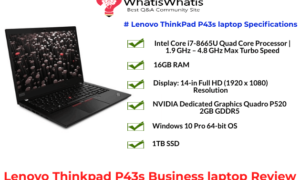Confused about whether a laptop and a PC are the same devices? Clear your doubt here. In this post, you will look through the similarities and differences between these devices. You will learn how technology has improved over the last few decades.
Technological advancements also updated the terminologies. Hence, keeping up with the new terms can be tricky. Many people ask, “is a laptop considered a PC” because laptops have components similar to PCs.
Why Is a Laptop Considered a Personal Computer?
Laptops are a form of PC because they have all the components that you can find on the desktop. They are compact yet equipped with a keyboard, mouse, memory, GPU, CPU, and display. Also, you can perform the tasks you can easily complete on a PC, like browsing the web, listening to music, playing games, and more.
The laptops have built-in batteries that can be charged simply by connecting a charger to an electricity port. Laptops, being compact, don’t have powerful components as PCs. Although laptops are delicate, they allow you to store huge amounts of data.
Sometimes, you may find your laptops slowing down. If so, you can take a look at some tips to improve the computer’s performance here. Or, as an alternative, you can also check this video:
History of Personal Computers
The earliest computers were designed only to be used by experts. The first modern system was launched in the 1940s for mathematical calculations, ballistic calculations, US army cases, and bookkeeping. They consumed more space than a laptop.
Then came MITS Altair 8800 (the first PC) in the 1970s for common people’s use. It ran on Intel 8080 chips. In 1976, there came Apple’s kit computer. It featured 64KB of RAM and 8-bit microprocessors.
History of Laptops
Since MITS Altair was not visually appealing, the first laptop computer or mobile computer was introduced in 1981. Osborne 1 weighed 24 pounds and had no battery. It was followed by IBM PC 5150 and Epson HX-20.
Find the: 15 Best laptops of 2022
The laptop featured a 5-inch screen, a floppy drive, and modern port incorporation, and it was portable. The launch of WWW (world wide web) spread the concept of PC to an extended level.
Difference Between Mac and PC
Nowadays, many people wonder whether they should buy a PC or a Mac. In technical terms, Mac is also a type of PC because it has the same hardware as PCs. The key difference is the operating system they have.
Mac computers run on macOS (Mac operating system), while other PCs run on Windows. Both Mac and Windows PCs have some software incompatible with each other. Laptops are portable versions of PCs, while Mac is another personal computer with a different OS.
Laptop vs. Desktop PC
Desktops and laptops both are personal computers with similar components and functionality. They are designed using a mouse or trackpad, GPU, CPU, display, hard drive, RAM, and keyboard. As discussed, laptops are portable versions of PCs.
Desktop PCs are designed to work while sitting on a desk. A laptop can be placed anywhere. Laptops have a less powerful processor and graphics processor and need a portable power source. Desktop PC with ample space provides perfect cooling solutions.
PC and Laptop: Differentiating Factors
As now you get an answer to ‘is a laptop considered a PC’, let’s discover some other factors that differentiate them. Laptops are all-in-one devices that don’t require any certain assembly. However, PCs require hooking up several external components.
Comparing the prices of laptops and desktops, you’ll have to pay more for a laptop even when having the same specs. Desktop computers are comparatively simple to upgrade. You can replace the PC’s components, but it’s not possible for laptops.
Who Needs Laptops?
A laptop is a perfect device to go with when you work on projects that include light coding and word processing. This is surely a better choice when you need to take your system outside the home. You can easily perform tasks that don’t require high processing power.
Some laptops are not reliable for highly-intensive and power-consuming tasks. You can use them for general purposes like study, MS Office-related work, streaming, net surfing, casual work, and entertainment.
What About Overheating?
To provide a compact design, manufacturers have to jam all the components in a limited space in laptops. That’s why they are more prone to overheating problems if you don’t care for them properly.
Desktop PCs, on the other hand, have enough space to accommodate large fans. They come with several cooling solutions like water cooling and have a powerful processor to run at a faster clock speed without causing overheating.
The Conclusion
Concluding everything discussed above, laptops can be considered personal computers. As you can see, they both have certain pros and cons. Every year, several new designs and models are launched in the market.






Leave a comment